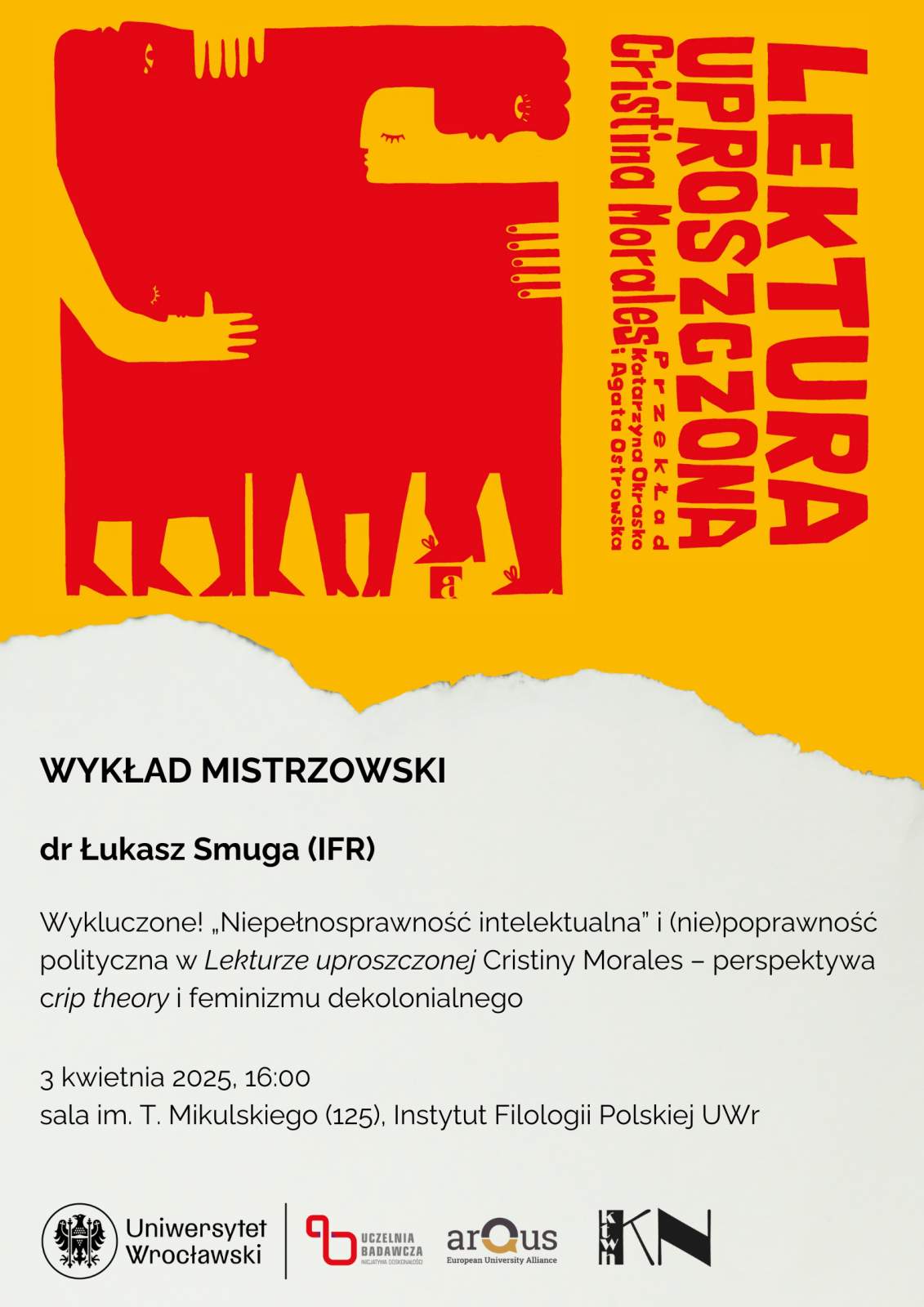
Dr Łukasz Smuga’s master lecture
Student Scientific Association of Contemporary Humanities Cultural Theories (Kulturowych Teorii Współczesnej Humanistyki ) has the pleasure of inviting you to a master lecture “Excluded! ‘Intellectual Disability’ and Political (In)Correctness in Cristina Morales’ Simplified Reading – A Perspective of Crip Theory and Decolonial Feminism” by dr Łukasz Smuga. The meeting will take place on April 3rd in room 125 at the Institute of Polish Studies of the University of Wrocław.
Lecture summary
Cristina Morales’ Lectura Fácil (Easy Reading) (ArtRage, 2024) is one of the most powerful and thought-provoking Spanish novels of recent years. It tells the story of four cousins with intellectual disabilities living in Barcelona in an apartment provided and funded by municipal social services, which tightly regulates almost every aspect of their lives. Through the perspectives of the protagonists, Nati, Patri, Margi, and Àngels, the novel exposes the systemic violence they endure. The novel portrays these women as being excluded from society not so much due to their “intellectual disability” but rather due to bureaucratic procedures of the modern welfare state and free-market mechanisms. In their daily lives, they employ various resistance strategies to reclaim their agency. The title Lectura Fácil (Easy Reading) refers to texts written in plain language, designed to facilitate comprehension for individuals with intellectual disabilities. However, Morales portrays this seemingly well-intentioned communication tool as a form of Newspeak, reinforcing infantilisation and systemic marginalisation.
The lecture will explore two key aspects: first, the mechanisms of systemic violence depicted in the novel—imperceptible to the general public but deeply felt by the protagonists of Lectura Fácil — and second, the resistance strategies inspired by, among others, the decolonial feminism of Bolivian activist María Galindo, author of ¡A despatriarcar! Feminismo urgente (2013) and Feminismo bastardo (2021).
The attempts by Nati, Patri, Marga, and Àngels to reclaim agency, as well as their critical stance toward a reality dominated by the rules of heteropatriarchy, neoliberalism, sexist behaviors, and the suppression of non-normative sexuality, will be analysed through the lens of crip theory. This theoretical framework rejects the medical paradigm that treats disability as a pathology requiring diagnosis and treatment. Robert McRuer’s Crip Theory: Cultural Signs of Queerness and Disability (2006) challenges the binary of able-bodied/disabled—both mentally and physically—by affirming the sexuality of “crips” and advocating for their empowerment. It values grassroots, culturally and politically radical initiatives led by disabled communities. Similarly, the protagonists of Cristina Morales’ Lectura Fácil attempt to build informal support networks as a counterforce to the oppressive system.
Bio
Dr Łukasz Smuga works as an assistant professor at the Department of Iberian Studies at the Institute of Romance Studies at the University of Wrocław. His research interests focus on contemporary Spanish novels, gender and queer studies, as well as autobiography and autofiction in Spanish-language literature. He is the author of the monograph Wbrew naturze i kulturze. O odmienności w hiszpańskiej prozie homoerotycznej na przełomie XX i XXI wieku (Universitas, 2016) [Eng. Queer Rebels: Rewriting Literary Traditions in Contemporary Spanish Novels (Routledge, 2022)] and co-editor of the monographs Among Others: Queer Perspectives in Hispanic World (InterAlia, 2017) and Memorias disidentes en las literaturas y culturas hispánicas (Estudios Hispánicos, 2022). From 2016 to 2019 and from 2020 to 2024, dr Łukasz Smuga was a member of the international research teams “Diversidad de género, masculinidad y cultura en España, Argentina y México” and “Memorias de las masculinidades disidentes en España e Hispanoamérica”. He is currently a member of the research group “CALITHI – Literatura i kapitalizm w kulturach hiszpańskiego obszaru językowego” and co-editor of the interdisciplinary scientific journal InterAlia: pismo poświęcone studiom queer.
Translated by Valiantsina Trafimuk (student of English Studies at the University of Wrocław) as part of the translation practice.

Date of publication: 24.03.2025
Added by: M.K.



